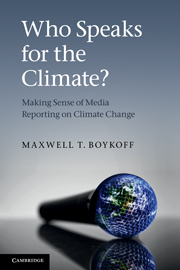6 - Signals and noise
Covering human contributions to climate change
Published online by Cambridge University Press: 05 June 2012
Summary
Due to the unprecedented scale of influences that humans have had on the global climate and environment, Paul Crutzen famously dubbed this contemporary time the ‘Anthropocene Era’ (2002). For billions of years, radiative forcing – producing changes in the climate – has occurred in response to energy imbalances. Atmospheric temperature change is the most evident form of climate forcing (Wigley, 1999). However, an effect of the energy harnessed through carbon-based industrial development has been GHG emissions and anthropogenic climate change.
The term ‘anthropogenic’ comes from the Greek root ‘anthropos’, meaning ‘human’. Anthropogenic climate change is also often referred to as the ‘enhanced greenhouse effect’. Anthropogenic sources include fossil-fuel burning (primarily coal, gas and oil) and land-use change. Current heavy reliance on carbon-based sources for energy in industry and society has led to significant human contributions to climate change, noted in particular through increases in temperature as well as sea-level rise.
- Type
- Chapter
- Information
- Who Speaks for the Climate?Making Sense of Media Reporting on Climate Change, pp. 121 - 144Publisher: Cambridge University PressPrint publication year: 2011



